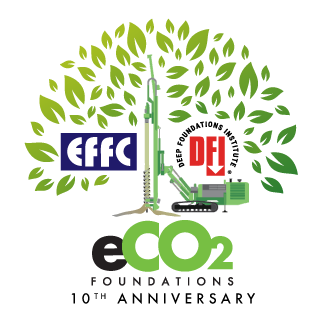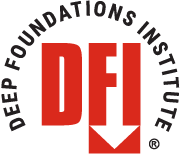Sustainability
To promote the UN Sustainability Development Goals that apply to deep foundations and excavation projects and help DFI members incorporate and advance sustainable practices.

Gerald Verbeek, MSc
Allnamics Pile Testing Experts BV
gverbeek@allnamics.com
Gerald Verbeek received his BSc in Civil Engineering from Delft University of Technology in 1981 and his MSc in Structural Engineering from the same university in 1983. After spending about 20 years in the Oil and Gas industry, Gerald started a management consulting business, Verbeek Management Services (VMS), in 2004. One of the activities of his firm is helping European companies with their business in North America and as part of that he has been active in promoting soil and foundation testing philosophies and equipment. In the area of foundation testing this is done through Allnamics USA, which provides a wide range of foundation testing equipment and services, and in the area of soil testing through BCE, a provider of hardware and software for downhole seismic testing. Gerald is active in various organizations: TRB (he serves on AKG20, the committee on soil and rock properties and site characterization, and AKG70, the committee on foundations of bridges and other structures), DFI (where he served for many years as the chair of the Testing & Evaluation Committee and currently chairs the DFI Sustainability Committee) and ASTM (where he is a member of D18, the committee on soil and rock and the chair of D18.01, the committee for surface and subsurface characterization).

Upcoming Events
-
Conference on Foundation Decarbonization and Re-use
May 28-30, 2024 – Amsterdam, the Netherlands
-
DFI Midyear Committee Meetings 2024
April 22-26, 2024
- Monthly Committee Meetings held last Tuesday of each month at 11:00 AM Eastern
Initiatives
Preconference Sustainability Workshop | DFI-EFFC Conference on Deep Foundations & Ground Improvement
A preconference workshop presented on Sustainability. Patrick IJnsen, I.Eng. of Van’t Hek Groep and Chris Harnan of Ceecom Consult Limited focused on current sustainable best practices and initiatives in the foundation industry. They discussed environmental, social and economic sustainability best practices, based on the UN Sustainable Development Goals.
Contents of this video
0:00 Intro
00:08 A Contractor’s Perspective – Keller
26:00 An Engineer’s Perspective
49:09 Transition to Sustainability
1:06:11 Sustainable Special Foundation Equipment
01:24:45 Green Steel Initiatives
01:47:56 A Contractor’s Perspective – De Waal
02:08:52 Sustainability in Engineering
02:33:08 Electric Foundation Rigs
02:48:04 A Contractor’s Approach to Sustainability – Keltbray
Sustainability Webinars
Watch recordings of previous webinars organized by the Sustainability Committee on sustainability topics.

EFFC/DFI Carbon Calculator
EFFC/DFI Carbon Calculator – tool that will calculate the CO2 emissions of foundation and geotechnical works. It is designed to allow contractors and commissioning organizations alike to assess the carbon footprint of their projects.
EFFC/DFI Carbon Calculator Use for Designers Webinar hosted by Gerald Verbeek, Katie Castelo and Kimberly Martin.
EFFC/DFI Carbon Calculator Webinar hosted by Gerald Verbeek and Kimberly Martin.
EFFC/DFI Carbon Calculator Training Webinar: Calculating your Project’s Carbon Footprint.
Publicize Sustainability Efforts of DFI Corporate Members
Raise awareness and encourage adoption of sustainability tools and processes applied by DFI corporate members.
Publicize Sustainability Resources Internationally
Links to rating tools and sustainability guidance commonly used in infrastructure and building development.
Foundation Reuse Task Force
DFI’s Foundation Reuse Task Force is working to promote reuse by leveraging experience among DFI members and collaborating across pertinent committees. Task Force activities include gathering and summarizing project examples that highlight unique applications and significant benefits of reuse, preparing webinars in collaboration with the IT$MONEY series, and hosting a panel session at the DFI annual conference to foster a conversation regarding overcoming the risks associated with reuse.
- FHWA Research Report: Foundation Reuse for Highway Bridges
- NCHRP Synthesis 505: Current Practices and Guidelines for the Reuse of Bridge Foundations
- MoDOT Research Report: Foundation Reuse: Length, Condition, and Capacity of Existing Driven Piles
- FHWA TechBrief Report: Workshop Report on the Reuse of Bridge Foundations
- Foundation Reuse Peer Reviewed Journal Papers
- Foundation Reuse Case Histories
Advance the Understanding and Use of Deep Foundations as Geothermal Heat Transfer Elements
DFI’s former Energy Foundations committee is now operating under the Sustainability committee and is continuing these ongoing initiatives:
Library of Case Histories of International Projects featuring Energy Foundations – coming soon
Learning Tools-Presentations on the background, resources, applications, construction workflow and management considerations required to design and construct effective energy foundations and results from relevant research – coming soon
Corporate Resources for Implementing Sustainable Practices
- CDP (previously Climate Disclosure Project) – A global disclosure and rating system for environmental impacts
- TCFD (Task-force on Climate-related Financial Disclosures) – A reporting tool to evaluate a company’s risks related to climate change and guide climate-related disclosures.
- GRI (Global Reporting Initiative) – A reporting and standards tool for companies to understand and communicate their environmental, social, and governance impacts.
- Envision – A rating and certification tool to evaluate the sustainability (including environmental, social, and economic aspects) of infrastructure projects.
- LEED (Leadership in Energy and Environmental Design) – A rating and certification tool to evaluate the sustainability (including environmental, social, and economic aspects) of building projects.
- EU Taxonomy for Sustainable Activities – System to classify environmentally sustainable activities to aid in the qualification of companies for green financing.
- Science-Based Targets – Guidance for companies on developing science-based net-zero targets
- Greenhouse Gas Protocol (GHG Protocol) – Greenhouse gas accounting standards and definition of Scope 1, 2, and 3 emissions
- INVEST – FHWA’s sustainable highways self-evaluation tool
- SASB (Sustainability Accounting Standards Board) Standards guide the disclosure of financially material sustainability information by companies to their investors. Available for 77 industries, the Standards identify the subset of environmental, social, and governance (ESG) issues most relevant to financial performance in each industry
Fundamentals
UN Sustainability Goals – In September 2015, the United Nations General Assembly adopted the 2030 Agenda for Sustainable Development that includes 17 Sustainable Development Goals (SDGs) to achieve sustainable development for all.
NCHRP Research Report 916 – Sustainable Highway Construction Guidebook – provides practitioner-ready guidance on how to identify and implement practices that advance sustainability during the construction phase of a highway project.
GeoConstructability – An Owner’s Guide to Obtaining Essential Geotechnical Information for Construction (documents the type of geotechnical information that contractors need to estimate, plan and execute foundation projects).
